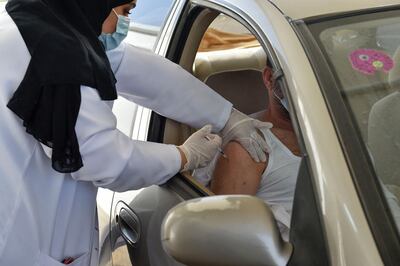Lessons learned from the Middle East’s response to the pandemic will help other nations yet to launch their national immunisation programmes, leading officials said on day two of the Hope Consortium conference in Abu Dhabi.
While rapid vaccination programmes have been the standout success of the outbreak, the UAE, Bahrain and Saudi Arabia said fast action was key to bringing infections under control in the early weeks of the pandemic.
“The main key factor was to create an ecosystem in the country with multi-health cooperation, efficient and resilient health systems, technology and innovation to encourage mass vaccination,” said Dr Hussain Abdul Rahman Al Rand, assistant undersecretary for health centres and clinics and public health at the UAE's Ministry of Health and Prevention.
“We had a strong media health campaign to target priority groups, starting with frontline workers, over 60s and those with chronic health conditions to protect those more at risk.”
Dr Al Rand said the approval of the Sinopharm vaccine for emergency use offered a roadmap out of the pandemic.
Saudi Arabia responded with the establishment of a ministerial committee of more than 20 members who meet on a daily basis to monitor the pandemic in the kingdom.
Test, trace and isolation protocols initiated in the early weeks of the pandemic were crucial, said the ministry of health’s public health undersecretary, Dr Hani Jokhdar.
“The government took the role to purchase vaccines for the country and then establish new vaccination centres, starting In Riyadh on December 17 and then Jeddah four days later.
“These mega centres were replicated across 13 regions, with 20 in total by the end of January.”

Saudi Arabia has made the vaccine available to everyone, with an average of 150,000 doses per day, which will increase as more supplies become available.
Saudi Arabia aims to vaccinate 70 per cent of its population before Hajj and supports a recognised vaccine passport for visitors.
In Bahrain, five different vaccines have been approved for use and technology was at the heart of the kingdom’s successful test and trace programme.
It has also enabled thousands of people to register for a choice of vaccines, free of charge.
“Vaccines are not mandatory, but many places like primary hospital and exhibition centres have been used as vaccination centres to protect [at-risk] groups in a short time,” said Dr Mariam Ibrahim Al Hajeri, assistant undersecretary of public health, Ministry of Health Bahrain.
“A mobile vaccination unit has also helped people at home or with special needs.
“The challenges were getting supplies in accordance with our immunisation plan. We had difficulty in the beginning, but with bilateral contracts we could get vaccines on time.
“Other challenges were storage but we enabled this in record time.”
Egypt, Iran, Pakistan and Tunisia have established production capability for vaccines, with Saudi Arabia and the UAE also due to come online soon.
Of the 22 nations in the WHO classified Eastern Mediterranean region, 20 have already begun vaccination programmes with Yemen due to start shortly.
Local production is also boosting confidence in reaching more areas.
Dr Rana Hajjeh, director of programme management, WHO Eastern Mediterranean regional office, said the vaccine was a ‘magic bullet’ but other methods of containment may be more appropriate where they are not yet available.
“The vaccine is part of 10 pillars used to manage the pandemic - they will not be the only control measure, but they are a magic bullet,” she said.
“With Ramadan coming up we need to enforce all the other successful social interventions that we have done up to now.
“It is a good month for good deeds and we need to do our best to think about the needs of the region.”








